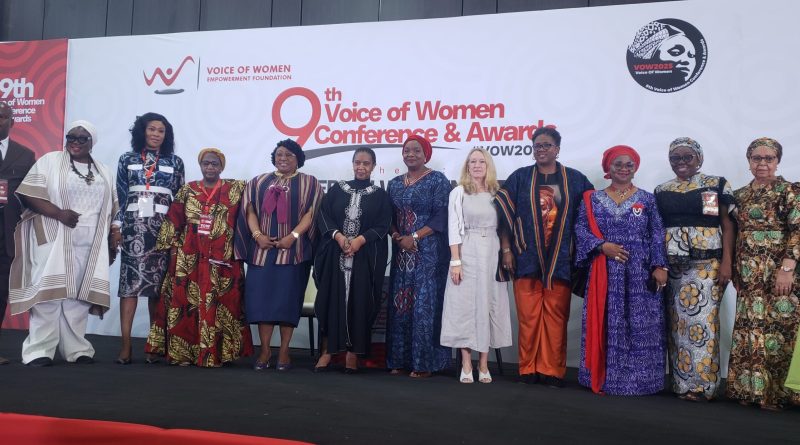Women leaders push for reserved seats bill, collective political power
Women leaders, development partners and grassroots advocates have renewed calls for the urgent passage of the Special Seats for Women Bill to boost female representation in governance.
The call was made in Abuja on Thursday, at the 9th edition of the Voice of Women (VOW) Conference and Awards, themed “Nigerian Women and the Power of Collective Action.”
The annual conference, convened by Women Radio, brought together government officials, development partners, traditional leaders, civil society groups and grassroots women from across the country to push for women’s political inclusion ahead of the 2027 elections.
In her remarks, Toun Sonaiya, the convener of the VOW conference, said Nigerian women must translate their strength as the country’s largest voting bloc into collective political power.
Ms Sonaiya noted that although grassroots women hold the highest number of permanent voter cards (PVCs), their political choices are often shaped by men.
“Eight out of 10 have PVCs but their votes are influenced. This reality calls for action. It’s time for every Nigerian woman with a PVC to transform her influence into collective power,” she said.
She added that women must support one another across political, economic, ethnic and religious divides to elect more women into leadership and transform governance in Nigeria.
The convener also urged the National Assembly to pass the Special Seats Reserved for Women Bill, describing it as critical to achieving true democracy.
Reserved seats for women bill
The Reserved Seats for Women Bill is a proposed legislation that seeks to create special seats exclusively for women in Nigeria’s national and state legislatures, as a way of addressing the country’s abysmally low female representation in politics.
At present, Nigerian women occupy less than five per cent of seats in the National Assembly which is far below the African Union’s 50 per cent parity target and the global average of 26.5 per cent. In the 10th Assembly (2023–2027), women hold only 17 out of 469 seats (about 3.6 per cent), a figure that has dropped compared to previous parliaments.
The bill is currently before the National Assembly and designed as a temporary measure, with a provision that it will last for 16 years, covering four election cycles after which it will be subject to review.
It has passed its Second Reading at the House of Representatives and will require approval by two-thirds of members in both chambers, as well as endorsement by at least 24 state assemblies, before it can be sent to the president for assent.
Why grassroots women rarely vote for women
Hansatu Adegbite, National Consultant for Private Sector Partnerships at UN Women Nigeria, presented the findings of a national survey conducted by Women Radio involving 3,743 grassroots women across Nigeria’s 36 states and the FCT.
Ms Adegbite said while 95 per cent of respondents possessed permanent voter cards, only 31 per cent voted for women candidates in the last election cycle, compared to 69 per cent who voted for men.
She noted that the absence of female candidates was the most common reason women gave for not voting their gender.
“When asked why they don’t vote for women, 82 per cent said few women contest. About 68 per cent felt politicians lack empathy, while 76 per cent admitted they vote based on what their husbands, community or religious leaders tell them,” she said.
She further highlighted that 42 per cent of respondents doubted the competence of women candidates, arguing they lacked experience for the offices they sought.
She added that regional differences also shape voting behaviour. In the north, 89 per cent cited the absence of female candidates as a key factor, while in the south, 62 per cent pointed to party influence and leadership as the biggest determinant.
Leaders back Reserved Seats Bill
Osasu Igbinedion, CEO of TOS Group of Companies, said the Reserved Seats for Women Bill is no longer just a gender issue but a nation-building imperative.
Ms Igbinedion noted that only 14 of 360 members in the House of Representatives are women, alongside four of 109 senators, which she described as poor and unacceptable.
“This is a bill whose time has come. Nigerians are clamouring for its passage. Any lawmaker who wants to return in 2027 must support it,” she said.
She added that barriers to women’s political participation were structural and cultural, stressing that reserved seats would bring women’s perspectives into governance and strengthen institutions.
Also speaking, Otunba Adejare, representing the Olowu of Owu, Saka Matemilola, said women’s collective action has historically driven peace, governance and economic resilience in Nigeria and beyond.
READ ALSO: Women leaders warn of backslide on gender equality in Nigeria
Mr Adejare noted examples such as the Market Women Association in Nigeria and the Women of Peace Movement in Liberia, saying women’s coalitions must now be recognised as institutional and measurable forces.
“Across the globe, women have reshaped policy and peace through unity. When women organise, systems shift,” he said.
Ogun commissioner stresses mentorship and humility
Morunrayo Adeleye-Oladapo, the Ogun State Commissioner for Women Affairs and Social Development, said grassroots initiatives such as the Nigeria for Women Project are strengthening women’s collective voice.
Mrs Adeleye-Oladapo noted that economic empowerment is crucial for women to play decisive roles in politics.
“When we are talking about politics, there’s no way you can do without money. But gradually, our women are beginning to build that economic strength. They are now able to say, this is the person we want, and no one can ignore them,” she said.
She added that women leaders must bridge the gap with grassroots women by meeting them where they are, listening to their realities, and building trust.
The commissioner emphasised mentorship, humility and inclusiveness in politics, warning that women who close doors to others after attaining office weaken collective progress.


